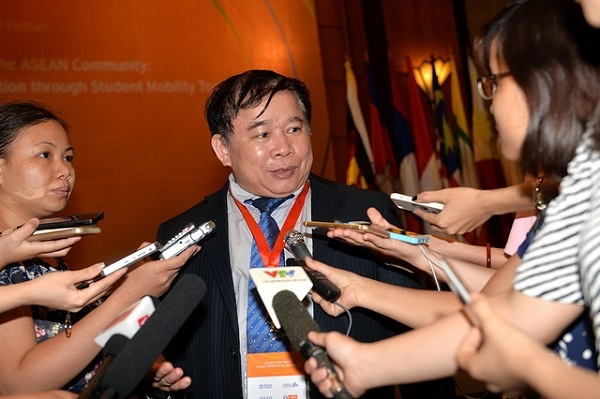.jfif) Opinion
Opinion

More than 130,000 Vietnamese students study abroad while only 20,000 foreign students study in VN, says Deputy Minister of Education
 |
Bùi Văn Ga, Deputy Minister of Education and Training, spoke to the newspaper Kinh tế & Đô thị (Urban & Economic Affairs) about Việt Nam’s efforts to attract foreign students
Will you please further elaborate on the movement of students in Việt Nam?
At present, we have more than 130,000 Vietnamese students studying abroad versus 20,000 foreign students studying in our country.
As a result of this disparity, the Government has worked out a plan to attract more foreign students to Việt Nam, particularly from the ASEAN block.
The Ministry of Education and Training (MOET) has prepared 34 advanced programs in some elite universities, including the Việt Đức (Germany-Việt Nam), Việt Nhật (Japan-Việt Nam), Việt Pháp (France-Việt Nam) International Universities and the Việt Nam Britain Institute for Research and Training. Studies will be conducted in English.
In addition, in mid-May a project of European Union Support for Higher Education in the ASEAN Region was launched to help the movement of students among the ASEAN nations.
The Ministry of Education and Training is in the process of finalising the National Qualification Framework (to make it equivalent to those of other ASEAN member states).
I’m confident that when our National Qualification Framework is approved, it will make the student exchanges among ASEAN member states more accessible.
Many people are concerned that the teaching quality in Việt Nam may not be on par with that in other ASEAN nations. How do you respond?
It’s true. That’s why since 2010 the MOET has focused efforts on improving foreign language teaching programs in general schools and in tertiary education. In addition, we have also prepared conditions for Việt Nam to integrate regionally and internationally.
While waiting for the National Qualification Framework to be approved, the MOET has distributed to universities the standards of the European Union as a reference for tertiary education in Việt Nam.
Do you have any comment on a report that some 200,000 Vietnamese university students graduates are now unemployed?
In 2016, the number of 12th graders registering for university or college exams is lower than previoust years’. Many have decided that once they graduate they will join the work force or attend vocational training courses.
I should say, our tertiary education training is not simply for Việt Nam’s labour market, but also for other ASEAN labour markets. That’s why teaching foreign languages, particularly English, has become a very important major in the students’ curriculum. And many of our students nowadays are aware of the importance of knowing a foreign language for finding a good job.
To help students find jobs after their graduation, what occupations does our tertiary education offers to them?
It is hard to predict the needs of the labour market in our country. As we all know, Việt Nam is on the road of development. Our economy depends on many factors, including foreign investment. But the Government has already worked out a few options regarding the occupations on which we should focus our training.
Last but not least, in tertiary education it is important to provide students with basic knowledge so that they can use it in various working environments._VNS




